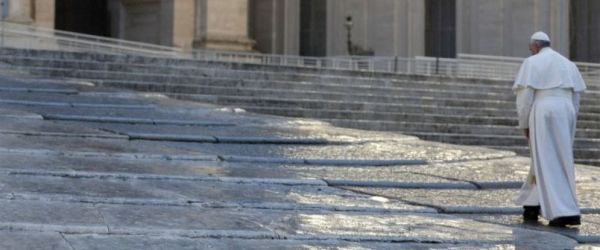This Sunday’s Gospel passage (cf. Lk 14:7-14) shows us Jesus participating in a feast in the house of one of the head Pharisees. Jesus watches and observes how the guests run, make haste to get the best seats. It is rather common behaviour in our time too, and not only when we are invited to lunch: one frequently seeks a place of honour in order to assert a presumed superiority over others. In reality this race to the forefront harms both civil and ecclesial communities because it destroys fraternity. We all know these people: social climbers who always clamber upwards in order to move up, up.... They harm fraternity, they damage fraternity. Faced with this scene, Jesus recounts two short parables.
The first parable is addressed to one who is invited to a feast and Jesus exhorts him not to “sit down in a place of honour, lest a more eminent man than you be invited by him; and he who invited you both will come, and say to you, ‘Please, move back, give place to this man’”. An embarrassment! And “then you will begin with shame to take the lowest place” (cf. vv. 8-9). Jesus instead teaches us to behave in the opposite way: “when you are invited, go and sit in the lowest place, so that when your host comes he may say to you, ‘Friend, go up higher’” (v. 10). Thus, we should not seek the attention and regard of others on our own initiative but, if anything, let others offer them to us. Jesus always shows us the way of humility — we must learn the way of humility! — because it is the most authentic way, which also allows one to enjoy authentic relationships. True humility, not false humility, the kind they call in Piedmont, mugna quacia. No, not that kind. True humility.
In the second parable, Jesus addresses the one who invites and, referring to the method of selecting guests, says to him: “when you give a feast, invite the poor, the maimed, the lame, the blind, and you will be blessed, because they cannot repay you” (vv. 13-14). Here too, Jesus goes completely against the tide, manifesting as always, the logic of God the Father. And he also adds the key by which to interpret this discourse of his. And what is the key? A promise: if you do this, you “will be repaid at the resurrection of the just” (v. 14). This means that those who behave in this way will receive divine compensation, far superior to human repayment: I do this favour for you expecting you to do one for me. No, this is not Christian. Humble generosity is Christian. Indeed, human repayment usually distorts relationships, making them “commercial” by bringing personal interest into a relationship that should be generous and free. Instead, Jesus encourages selfless generosity, to pave our way toward a much greater joy, the joy of partaking in the very love of God who awaits us, all of us, at the heavenly banquet.
May the Virgin Mary, “humble beyond all creatures and more exalted” (Dante, Paradiso, xxxiii, 2), help us to recognize ourselves as we are, that is, small; and to give joyfully, without repayment.
[Pope Francis, Angelus, 1 September 2019]












